The Little Havana celebrations of Fidel Castro’s death last month had a touch of mean-spirited delusion since perhaps Castro’s greatest achievement was defying American power and living to die of old age, observes Greg Maybury.
By Greg Maybury
Considering the deluge of bitterness and pique oozing from many in the U.S. political establishment in response to the death recently of Cuba’s former leader Fidel Castro, even some folks with more than a passing knowledge of key world events and history in general, might’ve been left wondering what all the fuss was about. Castro — a man as reviled as he was revered — led that country’s 1959 revolution, one of the most portentous tipping points in the Cold War, if not in modern history.
The following might serve at the outset to give such people an idea as to why his passing provoked such a bilious response from Washington. As Wayne Smith, a former U.S. diplomat and ambassador to Cuba in the early years of Castro’s reign under President Dwight Eisenhower (Smith was later President Jimmy Carter’s Cuban representative), once memorably opined, “Cuba seems to have the same effect on US administrations as the full moon has on werewolves.”
Now Smith might’ve said this almost three decades ago, but as the reaction to the Cuban leader’s death indicated, this reality persists, despite the recent thaw in official relations initiated by President Obama. To be sure, there’s rarely been a shortage of countries that could lay claim to having this transformative effect on the collective psyche of U.S. political establishment, Iran being a prime example.
But it is Cuba that stands out as an exemplar, and so much of that has to do with Castro himself. Put simply, among the iconic revolutionary’s many talents was an unerring ability to get up Uncle Sam’s nose, and get away with it so often for so long. Suffice to say, since they seem to have inherited the same basic instincts as their forebears, the bulk of present-day Washington’s “Werewolves” must’ve been privately “howling at the moon” as it were at the Comandante’s demise at age 90.
Castro was the only world leader who resisted U.S. hegemony and lived to tell the tale, surviving by some accounts more than 630 separate assassination attempts over decades. Indeed, it would not be a surprise if the individual who came up with the expression “terminate with extreme prejudice” had Fidel in mind.
Such is the animus towards all things Cuba and Castro, President George W. Bush refused his offer to provide teams of doctors to assist the Hurricane Katrina relief effort in 2005, one of modern America’s worst natural disasters. And with folks like former House Speaker Newt Gingrich labeling Castro a “tyrant” and likewise President-elect Donald Trump dismissing the former Cuban leader as a “brutal dictator” (while also placing in doubt the future of the recent rapprochement with Cuba), it’s clear that “animus” is still alive and kicking. For many, Castro’s passing is unlikely to change this much. The Werewolves have long memories.
A Historic Turning Point
Although Castro came to power at the tail end of the Eisenhower era, he was catapulted to world prominence shortly after the inauguration of President John F Kennedy in 1961. It was on JFK’s watch that the attempts to assassinate Castro began in earnest, all under cover of the infamous Operation Mongoose; this decidedly dodgy “black-op” involved the CIA working in collaboration with the Mafia no less, and assorted pissed-off Cuban expatriates, exiles, and Batista regime “refugees,” all seeking to take back the “farm.” All this was with the full knowledge of JFK’s brother Attorney General Robert Kennedy.
Although there is much conjecture as to whether JFK actually did know himself about Mongoose’s key objective, some find it difficult to accept he didn’t know given the brothers were “joined at the hip.” If indeed JFK did know, then he either ordered those involved — including Bobby — to stop and they were ignored, or JFK acquiesced. In the latter case, while he may not have been happy with doing so, such was the pressure on him over the Cuban “situation,” he may have gone along with it reluctantly. Like with so much of the JFK mythology, we may never know the answer.
Either way, Castro reportedly was deeply disturbed by JFK’s 1963 assassination, and the Comandante had good reason. Quite apart from having his hopes dashed for a rapprochement with the U.S. (JFK had earlier opened a back-channel communication link with the Cuban government, seeking to ease the tensions between them), Castro knew full well that if the U.S. could plausibly blame him for JFK’s murder — which he instinctively felt they’d try to do and which may have been the intention of those who engineered the hit — it would surely have escalated U.S. attacks on Cuba.
The following should further underscore the significant role played by Cuba during the Cold War. When asked in the acclaimed 2003 Errol Morris film Fog of War about the 1962 Cuban Missile Crisis – specifically, “how close” did the U.S. and the USSR come to an all-out nuclear exchange — then U.S. Defense Secretary Robert McNamara chillingly revealed that the two powers came “that close” (picture a grim-faced McNamara putting the tips of his thumb and forefinger so close there was little daylight between them).
The missile crisis was itself precipitated by Castro, who became an ally of the Soviet Union not long after the revolution of 1959 and who feared a full-scale U.S. invasion after the botched attempt at the Bay of Pigs in 1961. He invited Soviet premier Nikita Khrushchev to put some medium-range nuclear ballistic missiles on the island country (a counterpoint to U.S. missiles installed in Turkey).
As Cuba was located less than 90 miles from Florida, this triggered the scariest, most public, and potentially apocalyptic standoff between the two nuclear superpower archrivals. The stakes for humanity had never been greater.
Botched Regime Change
At this point it’s instructive to look back at some of the pre-revolution history of Cuba and its relationship with its giant neighbor. For our purposes though it is both sufficient and necessary to consider in some detail that other seminal historical tipping point of the Cold War involving Cuba and America, the Bay of Pigs invasion.
For those “buffs” of America’s regime change track record, along with its recidivistic propensity for interfering in the affairs — and ruthlessly exploiting both the resources and people — of other countries, the story of Cuba is one with which most will be well acquainted. From the early-to-mid 1950s, Castro fomented a popular revolution, and in 1959 after years of vicious, oppressive and corrupt rule by the U.S. client-dictator Fulgencio Batista, the rebels ousted him.
This is not an unfamiliar motif in the U.S. foreign policy narrative whereby the world’s loudest exponent of liberty, human rights, democracy, freedom and the rule of law, consistently relied on “klepto-brutocracies” like Batista’s to deliver anything but the above to their own people, almost always with varying degrees of unerring, bloody, tragic failure for them.
As for Batista, he’d earned his rightful place in the Client Dictators’ Hall of Fame, and then some. For years his rule generated deep-seated discontent, all of which seemed to go unnoticed by the Americans. He, his cronies and the Cuban elites of the era were enthusiastic supporters and beneficiaries of American business involvement in Cuba and, in particular, of the Mob (Batista was in the pocket of the notorious Mafia capo di tutt’i capi Meyer Lansky). All were making millions from gambling, prostitution, hospitality and tourism while bleeding the country dry and leaving the general populace far below the poverty line.
To say the Cuban people then were unhappy campers does not begin to describe the political, economic and social climate at the time. Eventually the chickens came home to roost for Batista as they do for most of America’s client dictators, although usually too late for those who’ve suffered under their sclerotic rule.
Much like the Shah of Iran 20 years later and Mobuto Sese Seko in the Democratic Republic of the Congo in 1997 to name just two examples, the U.S. left its hapless client up that brown creek without a paddle when it became obvious just how restless the natives were and how little the Americans could do about it.
In order to avoid having his corrupt and brutal ass tarred and feathered by his ungrateful subjects and run out of town, Batista quit his day job and rode off into the sunset, consoling himself by filling his saddlebags with a large swag of looted booty.
Castro, along with his brother Raul (who in 2008 took over the presidency), aided memorably by Marxist revolutionary, Argentinian doctor Chè Guevara, assumed control of the country. They quickly kicked out the Americans along with the Mafia, and nationalized most of their industries and businesses.
For Lansky and the rest of the Mob in particular, their Golden Cuban Goose was cooked. Yet this was seen as an exceedingly bad development not just for them, but everyone in Washington across the defense, security, intelligence and political establishment and in the boardrooms of those U.S. corporations who’d enjoyed massive profits during the crime/corporate-friendly Batista regime.
Thus was created the circumstances that would eventually lead to the Bay of Pigs invasion (click link here for an info-graphic and timeline), one of most ill-advised, ill-fated, ill-conceived, ill-managed adventure in U.S. history. A defining event of the Cold War to be sure, but also one of the CIA’s biggest cock-ups that set the stage for the Cuban Missile Crisis and possibly Kennedy’s assassination on Nov. 22, 1963.
The Bay of Pigs Blowback
Few foreign policy misadventures (those that became public knowledge at least), resulted in more immediate and vociferous response from the American public and international community, as did the Bay of Pigs fiasco. Even fewer ended in such obvious and enduring ignominy. If JFK had been enjoying the ride in Air Force One up until that point then, the “flight” became very bumpy with the Cuban “situation.”
JFK was so rattled by the Bay of Pigs experience, he threatened to “splinter the CIA into a thousand pieces and scatter it to the four winds.” CIA chief Allen Dulles and two of his senior CIA spook colleagues were eventually forced to hang up their trilby hats and trench-coats, a move that Dulles neither forgot nor forgave. The CIA, however, survived as an American institution that was synonymous with fighting the dreaded, so-called “Red Menace,” which – in the Western Hemisphere at least – was personified by Castro.
As for the Agency and its operatives who survived the purge, they never forgot Kennedy’s threat nor his perceived “betrayal” of the Bay of Pigs invaders when the mission went south.
So what exactly happened with the Bay of Pigs? In order to better grasp how it all came together — a phrase not entirely appropriate because when it really counted it all came spectacularly unstuck — some brief background is needed. The original plot was hatched during the Eisenhower administration under Dulles’s direction and in concert with his big brother, Secretary of State John Foster Dulles, the archetypal Cold Warrior, a man for whom leaders like Castro were anathema.
It involved utilizing the support of Cuban exiles, all of whom were mightily chagrinned at the new Cuban leader. If anything the Cuban exiles hated Castro more than the Americans did, and were eager to bed down with anyone who’d help restore them to their former glory.
A ‘Perfect Failure’
The truly ironic thing is that the Americans at one point did have opportunities to bring Castro inside the tent before the Soviets did. Despite the fact he’d expropriated the property of some U.S. corporations (including that of the ubiquitous, notorious United Fruit Company of Guatemalan coup fame and the poster child of rapacious, exploitative U.S. corporate fuelled neo-colonialism), he denied being a communist.
Nor were there any signs the as-yet-non-aligned Castro intended to bunk down with the Soviets. On his visit to America in April 1960, Eisenhower refused to even meet with the new leader, despite the fact the U.S. had formally recognized his new government. The sub-text of the Americans’ response might as well have been: “If we can’t own, pillage, plunder and exploit your country and bleed it dry, we don’t wanna know about you. Adios Amigo!”
Whether Fidel might’ve responded positively to any American overtures is now somewhat academic. But the truth is that no one will ever know. One thing we do know was that when the Americans “passed” on Cuba and ratcheted up the hostility, the Soviets didn’t miss a beat. and were “in like Flynn”! The rest as they say, is history, most of it as we’ll see, not so good! And so the stage was set for the Bay of Pigs.
Aptly described by Peter Kornbluh as the “perfect failure,” the Bay of Pigs was a disastrous mix of own goals, “mission myopia,” cock-ups and unalloyed hubris. The plan was so ill conceived that even the normally gung-ho Joint Chiefs of Staff knew it was bound to fail or had serious doubts. There are varying accounts as to whether they properly conveyed this to JFK, or there was some genuine misunderstanding.
But the reality was that the Chiefs had their own agenda — then as now, a not unfamiliar phenomenon in the annals of interagency rivalry within the US military, foreign policy and national security establishment. They wanted a full-scale invasion and knew JFK was not up for that under any circumstances.
Yet in effectively “nodding” a mission they knew had little or no chance of success, they calculated that Kennedy’s hand would be forced politically when that failure became obvious; the JCOS brass would then get their Big Day after all. From there they could claim bragging rights as the guys who came in and cleaned up the CIA’s mess, and Kennedy would cop all the flak for approving this “it seemed like a good idea at the time” operation.
It’s uncertain how the Chiefs were going to explain to Kennedy himself after the fact why they did not actively discourage the mission, or whether indeed they even gave this much consideration. It’s possible they short-changed JFK’s ability to “smell the rat” (that effectively he was set up by the CIA and the Chiefs), or figured that he would be so grateful to them later on when they had in fact cleaned up the mess he’d forgive and forget their treachery.
As it turned out, JFK did detect the “odor of rodent” before the mission was finally aborted. In order to minimize the failure, Kennedy refused to approve the necessary extra air cover that everyone was clamoring for, and that they insisted would snatch victory from the jaws of defeat. Kennedy didn’t buy this, and, once the penny dropped, seemingly preferred to cut his losses there and then.
From there on, collectively the brass was persona non grata with JFK, as he simply deduced he could no longer trust them. Much to their chagrin, they didn’t get their “boots-on-the-ground” gig as hoped. To underscore how unsettled the JCOS were about this, around 18 months later at the height of the Cuban Missile Crisis, the then U.S. Air Force General Curtis (“Bombsaway”) Le May along with his JCOS colleagues began foaming at the mouth and literally wanted to nuke the Soviets and the Cubans back to the Neolithic Era. That Kennedy prevailed over this pressure is a matter of history of course; the fact we’re all still here talking about it is some testament to that.
Lock ‘n Load
As for the invasion however, with some modification to the original plan, in early April 1961, JFK gave the CIA and the exiled “Cubanistas” — who by this time had foam coming out of their mouths — the go-ahead. Presumably this was partly because he had a measure of respect for Allen Dulles and his judgment. While this was Dulles’s (and Eisenhower’s) baby, JFK accepted the parentage.
In preparation for the invasion, equipment, supplies and materiel were parachuted into the designated invasion location earlier with planes piloted by Cuban exiles accompanied by CIA mercenaries. However as luck would have it, much of this logistical support was lost in the swamp close by. Moreover, a pre-invasion air support strike was supposed to soften up the Cubans, break their morale, and destroy or render inactive most of the Cuban Air Force. As it turned out, the attack destroyed only a handful of planes, with a number of civilians ending up as collateral damage.
The decision not to follow-up with additional air support left the invaders with their “paramilitary peckers” swinging in the Bay of Pigs’ sea breeze, so to speak. They quickly ran out of — or were unable to locate — their supplies. Over the next three days, there was intense fighting between the two forces; but before it even started really, it was all over for the counter-revolutionary wannabes.
Amazingly, before the invasion, the CIA was apparently tipped off by the Soviets — presumably because they wanted to give the Americans pause about any aggressive military ambitions — that Castro was aware of a possible attack and/or invasion. For his part though Castro apparently expected that any such operation would be a full-scale military campaign, not the piddling bunch of deluded, right-wing, rag-tag, rabble-rousing soldiers of misfortune that eventually did do so.
Incredibly, the CIA folk adopted a “need to know” response to this critical piece of information and omitted to tell JFK when there was still ample opportunity, possibly explaining why the normally unflappable president went ballistic later. It’s difficult to see how Kennedy would’ve green-lighted the operation had he been “in the know” on this. In anticipation of such an invasion, the preternaturally charismatic Fidel mobilized all his armed forces and rallied for moral support any and all Cuban nationals who could hold a pitchfork or machete and see over the steering wheels of their Ford convertibles and Chevy pickups.
A Cult Following
The Bay of Pigs invaders eventually were outgunned, outnumbered, out-maneuvered and out-smarted. Having nowhere else to go, the “paramilitaries” high-tailed back to the beaches of the Bay of Pigs. Those that weren’t killed, either surrendered or were captured, with some later executed.
There are some further observations about the Bay of Pigs “fiasco” (as JFK aptly defined it) to note. Before the invasion the Cuban revolution was, by some accounts, running out of puff. Either way, after the botched invasion and the resulting worldwide publicity, it was unstoppable.
The location of the Soviet missiles in Cuba in October the next year — the decision taken as a direct consequence of the fallout from the Bay of Pigs to discourage any further thoughts of regime change — was the most provocative, potentially consequential acts in history.
As for JFK, he was both devastated by the failure and humiliated by the fallout of the mission. Given this was a man unaccustomed to failure, it must have been a heavy cross to bear. He’d however get an opportunity to redeem himself with the Cuban Missile Crisis, but his legacy was forever stained. As for the CIA, its senior executives got to understand the meaning of “blowback.”
Interestingly, one of the reasons why the Bay of Pigs operation was unsuccessful was much the same as why the Iraq invasion in 2003 was an unmitigated disaster: like those involved in, and who supported, that monumental foreign policy miscalculation by the U.S., they believed the Cuban people would be grateful for being liberated from Fidel’s tyranny and rise up in arms against the oppressors. Of course, history tells a different story.
A Historic Moment
The events surrounding Castro and Cuba also resonate throughout the enduring mystery of Kennedy’s assassination, whether the Official Story of Lee Harvey Oswald and his involvement in the “Fair Play for Cuba Committee” or the Unofficial Story that Kennedy was killed as payback for abandoning the Cuban exiles (and friends of the Mafia) at the Bay of Pigs and his retaliation against the CIA.
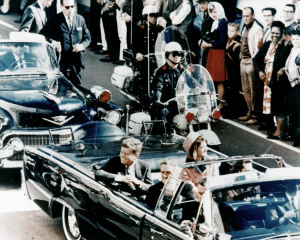
President John F. Kennedy in the motorcade through Dallas shortly before his assassination on Nov. 22, 1963. (Photo credit: Walt Cisco, Dallas Morning News)
No other foreign country comes remotely close to having any more connections to the momentous Kennedy assassination than does Cuba. For this reason alone, Cuba — and by extrapolation Fidel Castro — will feature large in any future historical narrative.
That said — love him or hate him – Castro’s place in history is guaranteed, much more so I suspect than most of his critics and enemies, past and present, most of whom are likely to end up as mere footnotes by comparison.
And as we have seen some many times throughout the American Cold War narrative, every fringe-dwelling, Marxist/Leninist and/or AK-47 packing, left-wing-leaning revolutionary wannabee in Latin America will pull out all stops to see if he or she might emulate Castro’s David and Goliath feat and kick the “gringos” where it really hurts.
That none has so far fared as well as Castro is a matter of history. Indeed, we might say this “standing up to the Man” was Castro’s most singular achievement. Even now, in the post-Castro era, Cuba itself will always remain an historically ineradicable symbol of fervent resistance to — and overt defiance of — Uncle Sam’s unerring, recidivistic predisposition for pillage and plunder in other people’s backyards.
For years, the CIA expended more time, money, ingenuity and energy in trying to “off” Fidel than they have in trying to “off” all of the other heads of state together that they’ve ever had in their sights for over 60 years. They cooked up all manner of outrageous, cockamamie Spy v Spy schemes such as placing small exploding devices in his cigars; administering exotic bacteria, viruses or toxic poisons by a multitude of means and methods; and giving him LSD in public so he’d flip out and lose face.
They even considered using non-discernible microbionoculators (lethal darts with undetectable poison fired from a high-powered gun), to all manner of bizarre plots and schemes such as administering chemicals to make the Comandante’s facial hair fall out.
The fact then that Castro still saw off 10 U.S. presidents is a remarkable feat unto itself. His success at survival made the celebrations in Little Havana in Miami, Florida, at the news of his death at age 90 seem pathetic and silly. While the anti-Castro Cubans may have been grinning from ear to ear and jumping for joy, it seems safe to say “Fiddy” had the last laugh on both his enemies in Miami and the Werewolves of Washington.
Greg Maybury is a freelance writer based in Perth, Western Australia.

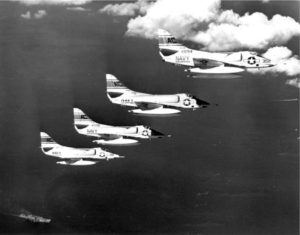
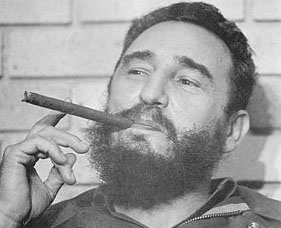
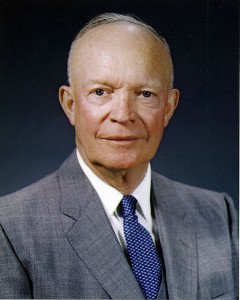
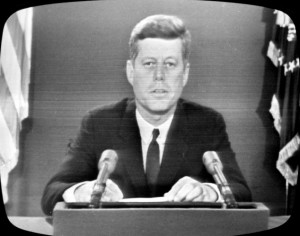
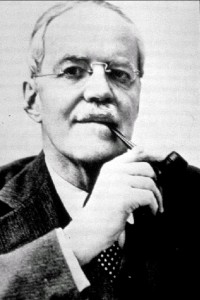
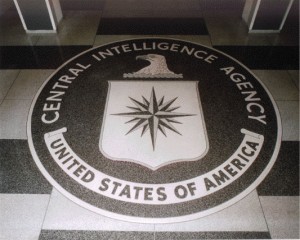
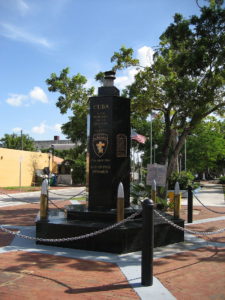
Meyer Lansky, remember, he ran Israel’s supply of money to Israel from Cuba’s gambling, prostitution of Cuban Women, sugar, rum industries, as did Arnold Rothstien, with the running of alcohol from Montreal, Canada to the U.S. during Prohibition. Prohibition was initiated by the maker of Seagram’s, Samuel Branfman. Eisenhower was reportedly Jewish/Zionist, executioner of Gen. George Patton, and millions of Germans after WWW2, initiated by the Kharzanian Zionists, who murdered millions of Russians 1917 until after the death of Zionist/Jesuit Stalin. Enough said!
The Miami mob just can’t get over the fact that they will never
get the family sugar plantation back again. Qué lástima.
I’ve long been torn about who to give the most blame for the Bay of Pigs operation. Why did Eisenhower allow this massive cluster-**** to get out of the planning stage? He wasn’t the greatest general of all time, but if he was in his right mind he sure knew better than this! But was he in his right mind in the late stages of his presidency? He had at least one stroke in the late Fifties, and that in combination with his life-long habit of heavy smoking couldn’t have done good things for his brain. A person has to also consider the possibility that “Ike” set up Kennedy to demonstrate that electing as President a former lieutenant, junior grade Naval officer wasn’t a great idea. (something we learned more recently when a rich AWOL guy was elected by a 5-4 vote to move into the White House)
For him to have permitted this operation to go forward would seem to show that Kennedy wasn’t really in charge. When he did try to grab the reins of power he ruffled the feathers of the CIA and the Big Brass military alike. Plenty of motives there for getting rid of the guy. And both groups knew that Castro would likely get the blame, so why not?
“The missile crisis was itself precipitated by Castro, who became an ally of the Soviet Union not long after the revolution of 1959 and who feared a full-scale U.S. invasion after the botched attempt at the Bay of Pigs in 1961.”
This statement implying that Castro somehow precipitated the crisis is way off base. It was Washington that caused the entire crisis by encircling and destabilizing Cuba at every opportunity and launching the counter revolutionary invasion. Furthermore Washington also caused the crisis by stationing nuclear weapons in Turkey which is on the USSR’s doorstep. Castro’s back was against the wall, he had nowhere else to turn. It’s not dissimilar to the Molotov-Ribbentrop Pact which saw the Soviet Union backed into a corner, totally rebuffed by Western Europe and fearing a Nazi invasion.
To imply that Castro “precipitated” the crisis is misleading.
Drew, sometimes your comments are just plain brilliant. I can’t help but wonder. Were you playing ‘devil’s advocate’ by praising Bugliosi’s whitewash of the Warren Commission Report…or did you really buy into that tapestry of lies and omissions?
And with folks like former House Speaker Newt Gingrich labeling Castro a “tyrant” and likewise President-elect Donald Trump dismissing the former Cuban leader as a “brutal dictator” (while also placing in doubt the future of the recent rapprochement with Cuba),
How many crimes against humanity has Newt Gingrich supported? On the other side of the moral ledger, what has he ever done to provide healthcare to the American people that could possibly compare with what Castro did in Cuba?
The majority of “Cuban” Americans are born in the US and most probably have never been to Cuba. The remaining older generation, born in Cuba, keeps busy spewing hatred and disseminating lies. As one article indicated: the only homeless Cuban child lives in Miami.
The way I look at it, is Batista had a much better departure from public life than did JFK, RFK, MLK, and Macolm X. How can America of the sixties have a better judgement than Fidel Castro when so many souls were loss with the Vietnam Conflict.
”Interestingly, one of the reasons why the Bay of Pigs operation was unsuccessful was much the same as why the Iraq invasion in 2003 was an unmitigated disaster: like those involved in, and who supported, that monumental foreign policy miscalculation by the U.S., they believed the Cuban people would be grateful for being liberated from Fidel’s tyranny and rise up in arms against the oppressors. Of course, history tells a different story.”
Greg Maybury I can’t thank you enough for this important synopsis of America’s History With Fidel. Of course you got it right, the enigma of the period from The Bay Of Pigs to Castro’s funeral is a giant story of the failure of Pax Americana, and as I’m convinced, that All Dreams of Empire will fail.
Alan Dulles thought himself to be a great story-teller, the intrigue he could “dream” up was unparalleled. One can get a sense of his gift for drama by reading about his planning for the overthrow of Mohammad Mosaddegh in 1953, as described by David Talbot’s “The Devil’s Chessboard.” Alan Dulles was probably the most responsible for the tragic arrangement that not only planned for the Bay of Pigs but also set up the hierarchy that has been so spectacularly unsuccessful in American Foreign Policy ever since. That is why solving the JFK Assassination is crucial even now.
Many thanks Mr. Maybury and Mr. Parry.
https://www.amazon.com/dp/0062276166/?tag=conspiracyarc-20